Exploring Middle-earth with cards is mostly a blast in Lord of the Rings: Living Card Game
Deck building challenges and a high-production PvE campaign make the game an exciting prospect.
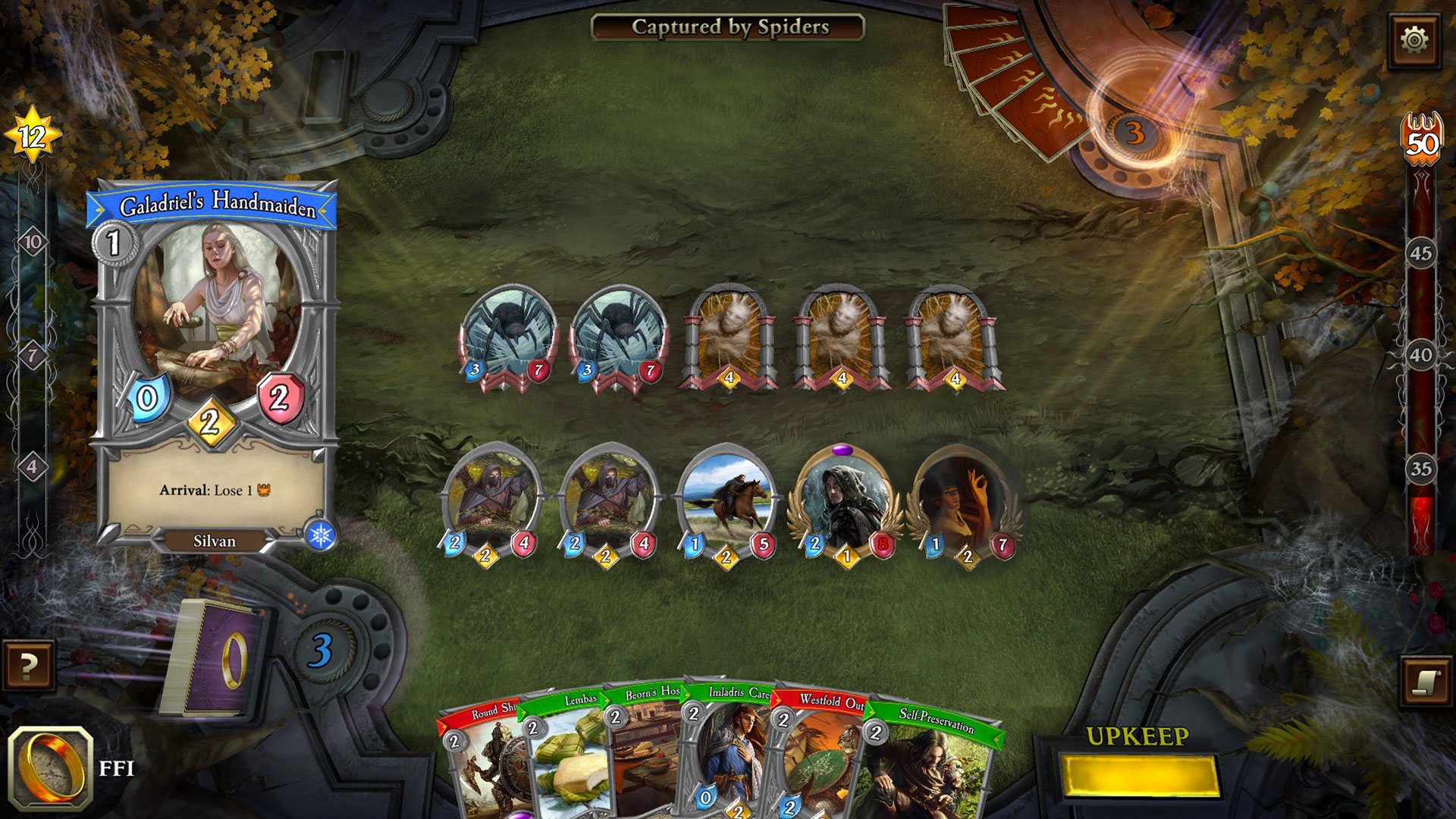
The Lord of the Rings Living Card Game is a singleplayer (and forthcoming cooperative) card game that pits you against the computer, challenging you to build decks of cards to take down narrative quests that are part story, part puzzle, and part challenge. In many ways it’s a standard digital card game, with characters that attack, life pools, and battlefield-manipulating special powers.
In other ways, it’s not: the quests you go on and characters you play are lovingly voiced, and some are quite well written—if in the Tolkien style. It’s a design that’s influenced by Fantasy Flight Games’ tabletop card game, but takes a new direction by using a smarter AI capable of more choice and updating many of the cards to have wholly new effects utilizing things only computers can do well. We’ve kept our eye on the game throughout this year, last playing it just a few months ago, and it has continued to look good heading into its release on Early Access this week.
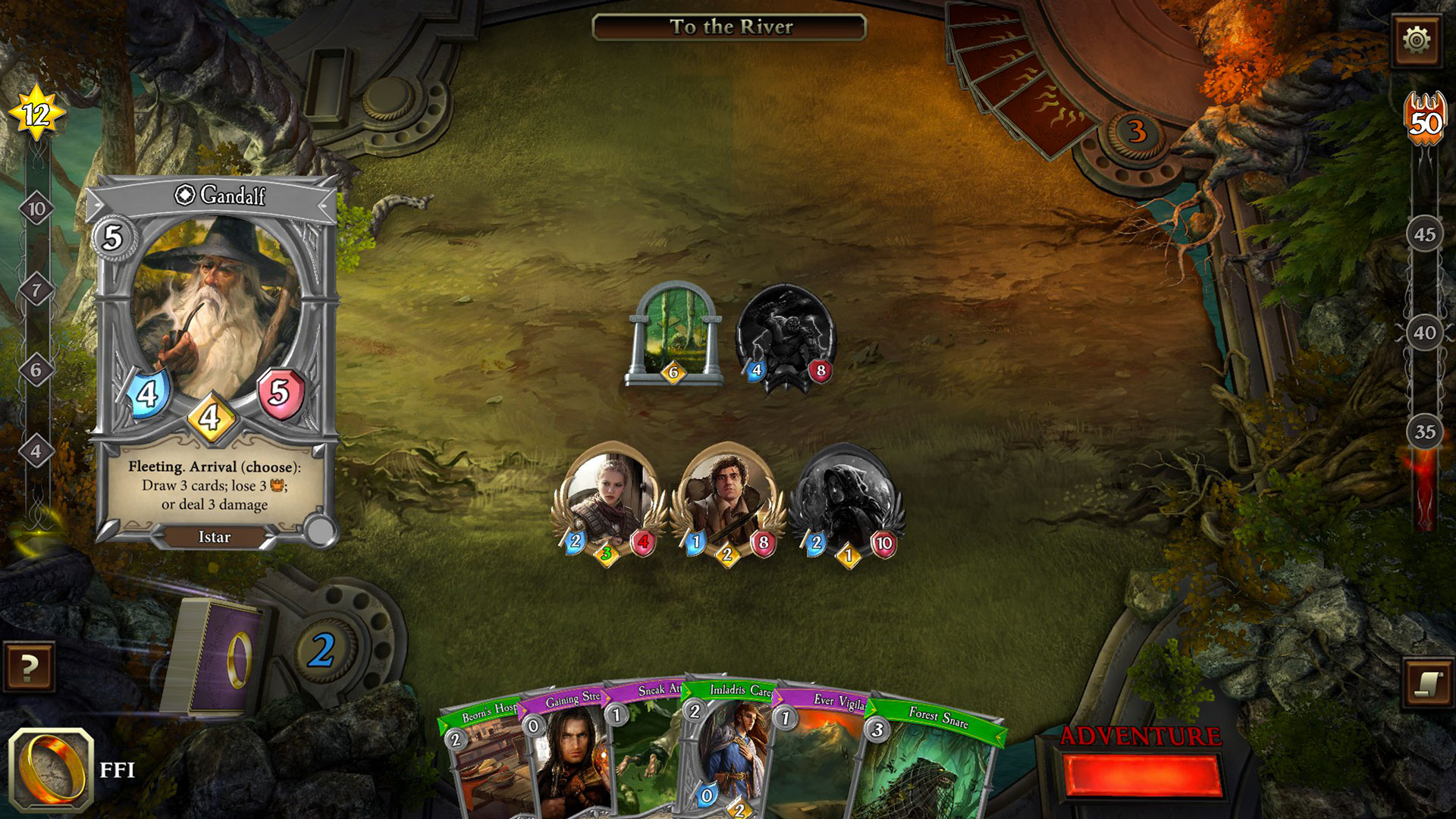
LotR LCG is currently in Early Access, with a handful of missions in a single overarching quest available. Each mission lets you take in a deck of 30 cards headed up by three Heroes, with an intense, almost puzzle-like emphasis on figuring out what events will come in the mission and how to counter them in your own deck building. That puzzling, challenging element is emphasized by speed: when a round goes by, Sauron gets points in a Threat meter—as that meter reaches thresholds, it deals out events like a swarm of dangerous enemies or debilitating events. You also only have thirty cards in your deck, so take too long and you’ll not only get hit with nasty powers, but you’ll run out of resources to win with.
It’s satisfyingly hard, almost requiring you to go into a mission on easy the first time around so that you can see how the mission plays out and what Sauron’s deck is like. The higher difficulties do more and more to hamstring you, adding nastier surprises and more vicious random events. For now you fight Sauron’s forces alone, though in the future another will be able to join you in two player cooperative.
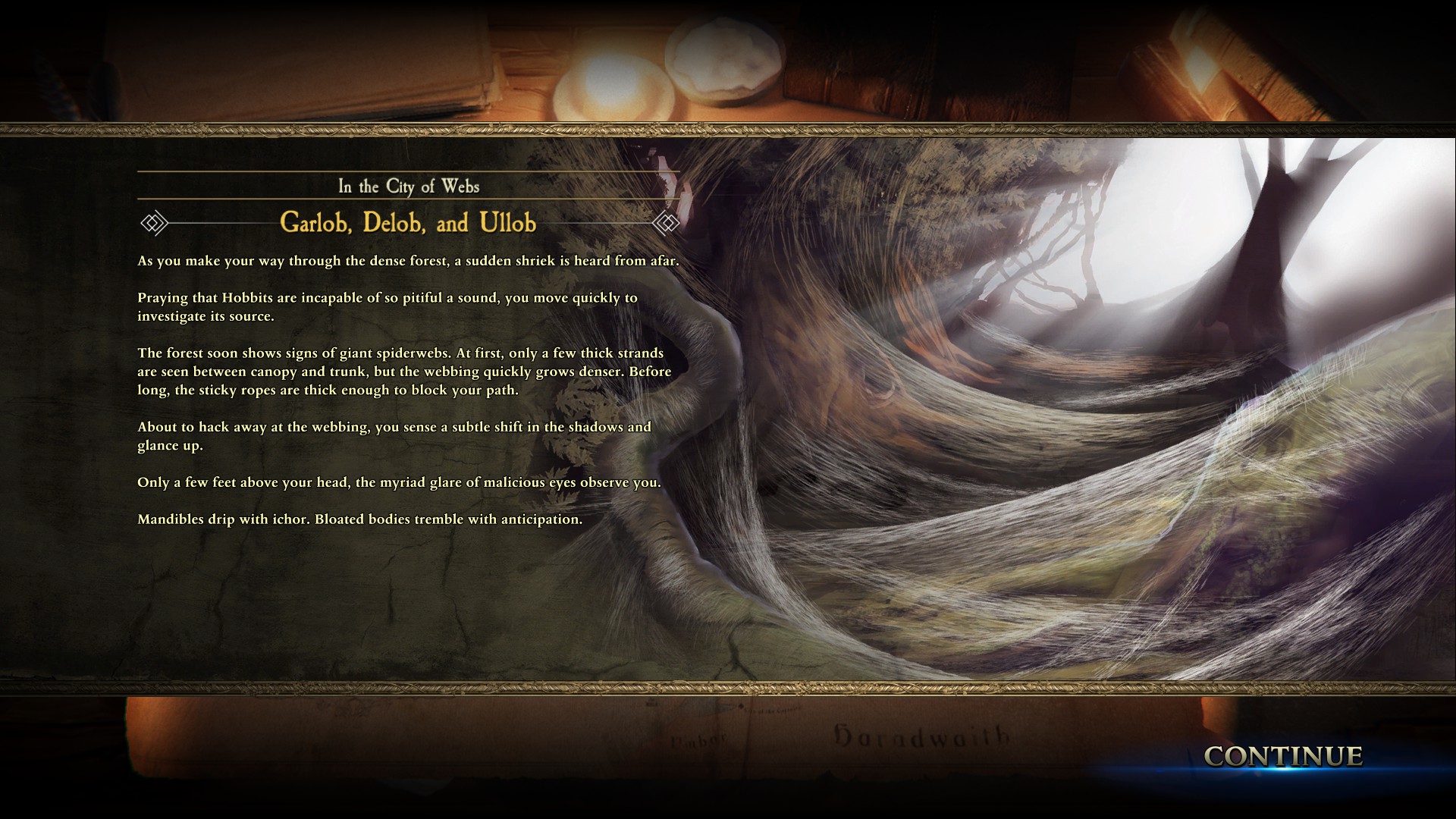
LotR LCG hinges on playing and replaying specific missions, either to take new branching paths, use new characters, or try out new decks. It’s an emphasis on scenario-driven gameplay that makes the deck building interesting and gives you a reason to keep coming back. If you can’t approach those scenarios in new and interesting ways with new and interesting decks, then why isn’t this a one-and-done experience?
This is not a question I have to answer, because the deck building is pretty good. Each deck is built around three heroes, and each hero is from a Sphere—purple Leadership emphasizes versatility, green Lore focuses on healing and hope, blue Spirit wants you to use tricks and planning to win, and red Tactics hits hard and fast while keeping the enemy from doing the same. The colors of your heroes determine what colors of cards from your collection can be in your deck.
There’s a satisfying array of strategies and syntheses already in the game. One of my favorites so far is an Aragorn, Arwen & Eowyn deck that focuses on empowering and buffing a few choice heroes while allies take hits and complete quest objectives. Another is a Legolas, Tom Took, and Dwalin deck that doesn’t have much healing but gets a ton of mileage from its numerous allies by rotating them in and out of combat using tricky cards and clever ranged attacks.
The biggest gaming news, reviews and hardware deals
Keep up to date with the most important stories and the best deals, as picked by the PC Gamer team.
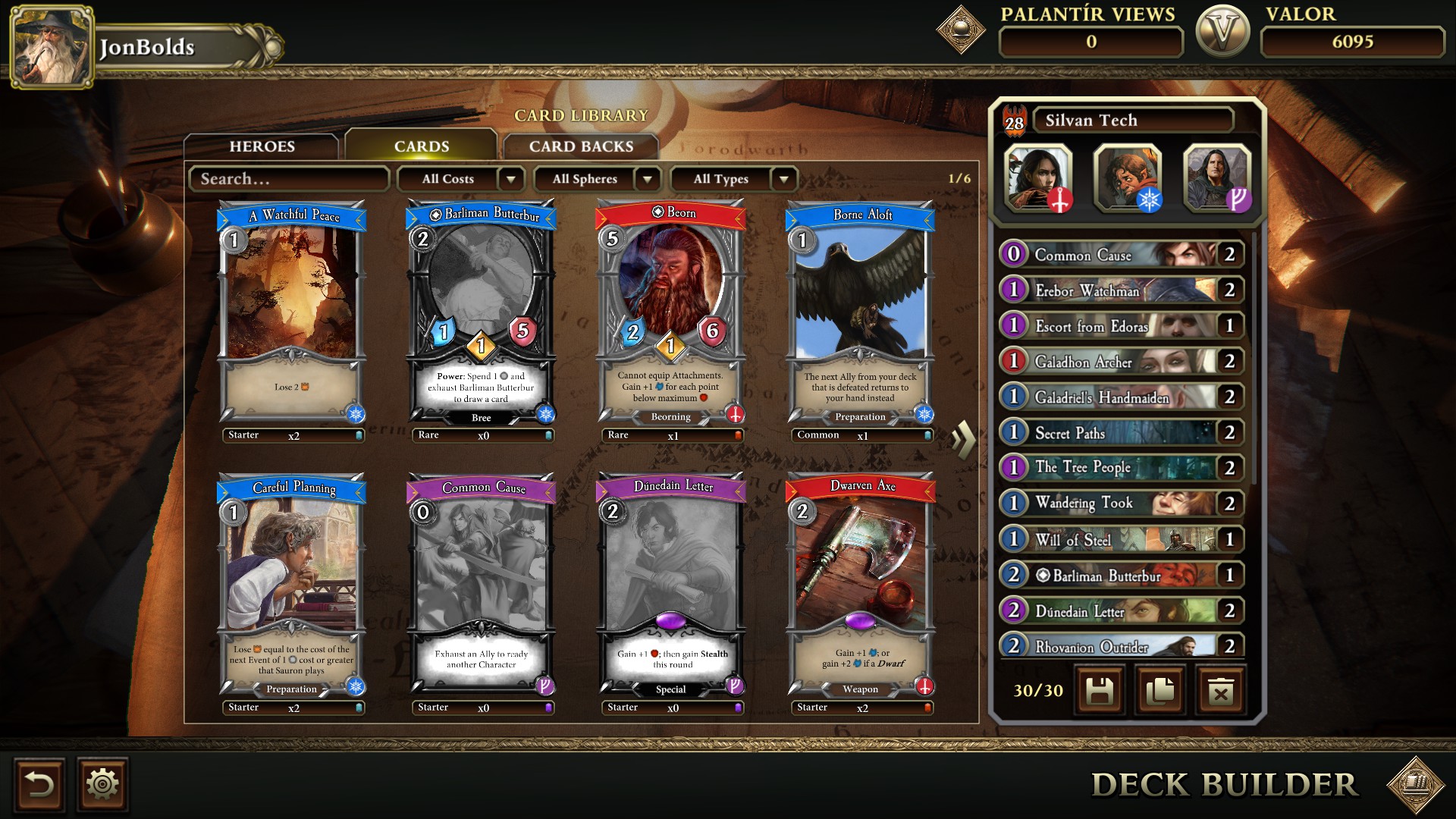
Unfortunately, your ability to engage with deck building is quite limited at first. The starter card set doesn’t focus well on combos or clever tricks, instead focusing on solid core cards with decent value for their costs, and saving up in-game currency to get access to more interesting combos obviously takes time.
Both packs of new cards and new missions cost an in-game currency called Valor. As you finish missions in a quest, you unlock the ability to purchase successive missions or unlock them with Valor. Heroes are unlocked by spending Valor or money on a new card pack with that hero and a full set of four cards. Fitting the living card game model, you always know what those cards are. Other cards can be purchased individually using Valor. I never quite felt completely shut off from buying new content I’d unlocked—with one exception.
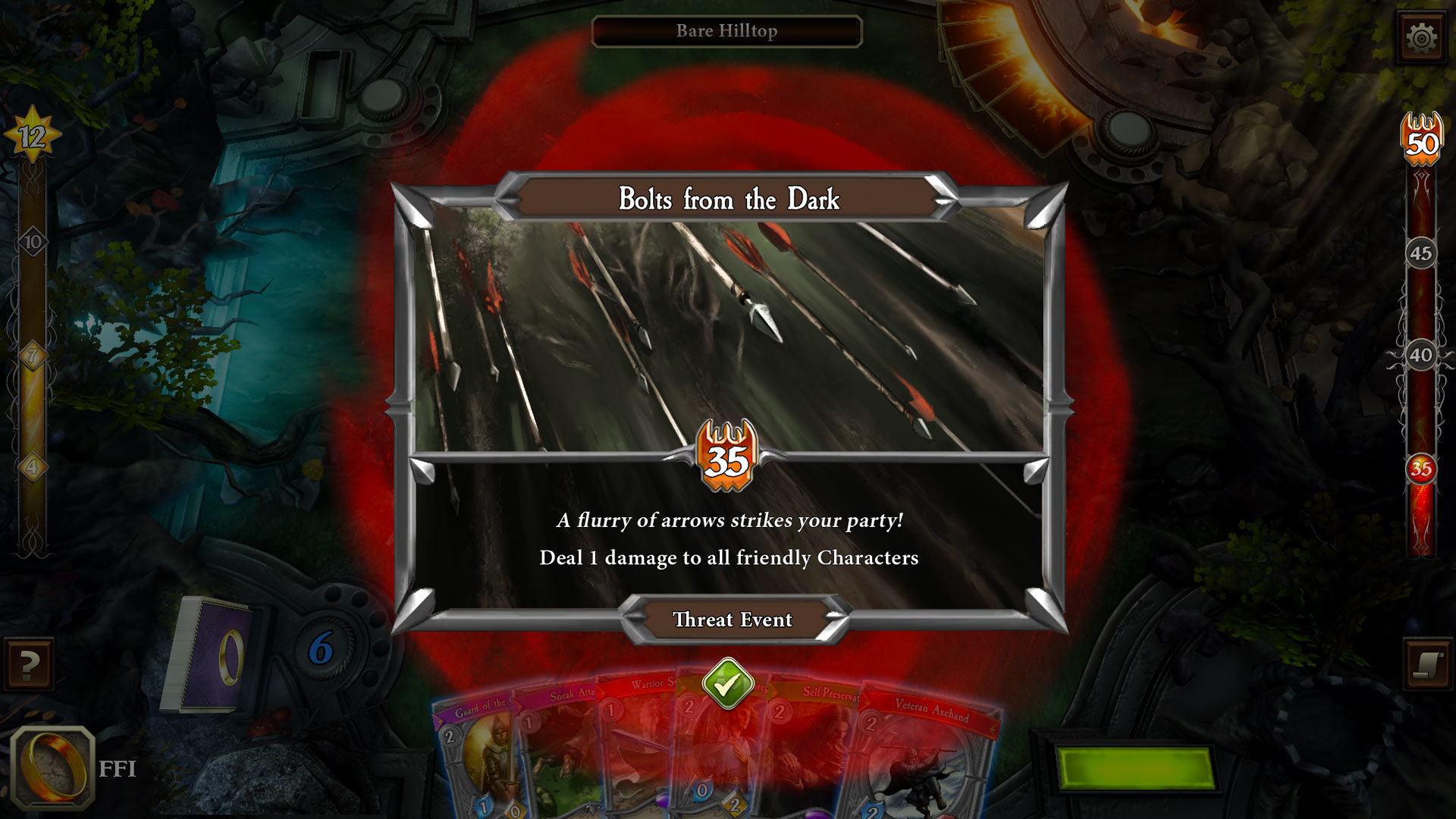
Valor only comes in a trickle at first. You can get a few hundred on missions, but that can be hard with the starter cards. You can get a few hundred more for daily quests. But you need nearly 4,000 to unlock a mission or a new Hero pack. That could be hours of grinding the same mission to see the next part of a story. If you fail missions you get nothing, so if you don’t quickly pick up the game’s basics you’re going to get new stuff even slower. Those who want to jump in and play this game for hours on buying it, rather than for an hour each day, would do well to go ahead and accelerate their start with one of those more expensive versions of the game.
The LOTR LCG comes in $7.99, $15.99, and $29.99 standard versions. There's also a $47.99 “everything and the kitchen sink” bundle, which is literally just the other three bundles put together with a few exclusive cosmetics. Those who buy the basic version expecting a big, sprawling campaign with no grind to unlock new things are going to be sorely disappointed.
That leaves a bad taste in my mouth, and makes it hard to unreservedly recommend what’s definitely a game in an underserved niche on PC. However, the game is currently in Early Access—hopefully the slow start is something the developers will address. Along with that Early Access tag come the usual quirks: visual bugs, hitches, and some annoying slowdowns, though I had no hard crashes and only one gameplay-breaking bug in about six hours of play.
With more quest lines coming in the future and cooperative multiplayer on the way, this is a game I’m definitely coming back to as development continues.
Jon Bolding is a games writer and critic with an extensive background in strategy games. When he's not on his PC, he can be found playing every tabletop game under the sun.

